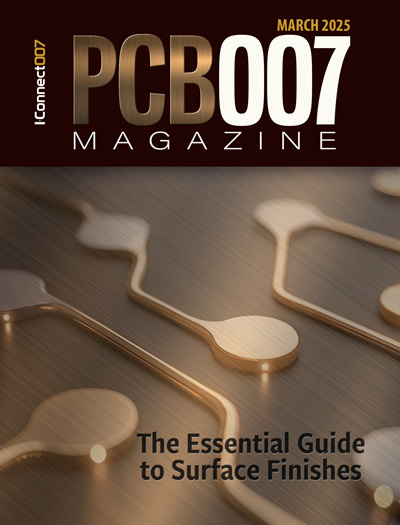-

- News
- Books
Featured Books
- pcb007 Magazine
Latest Issues
Current Issue
In Pursuit of Perfection: Defect Reduction
For bare PCB board fabrication, defect reduction is a critical aspect of a company's bottom line profitability. In this issue, we examine how imaging, etching, and plating processes can provide information and insight into reducing defects and increasing yields.

Voices of the Industry
We take the pulse of the PCB industry by sharing insights from leading fabricators and suppliers in this month's issue. We've gathered their thoughts on the new U.S. administration, spending, the war in Ukraine, and their most pressing needs. It’s an eye-opening and enlightening look behind the curtain.

The Essential Guide to Surface Finishes
We go back to basics this month with a recount of a little history, and look forward to addressing the many challenges that high density, high frequency, adhesion, SI, and corrosion concerns for harsh environments bring to the fore. We compare and contrast surface finishes by type and application, take a hard look at the many iterations of gold plating, and address palladium as a surface finish.
- Articles
- Columns
Search Console
- Links
- Media kit
||| MENU - pcb007 Magazine
IPC Rising Star Award: Feng Xue, IBM
April 22, 2025 | Nolan Johnson, I-Connect007Estimated reading time: 4 minutes
The IPC Rising Star Award is given to IPC members who have taken leadership roles and supported IPC standards, education, advocacy, and solutions to challenges faced by the industry. Their contributions have made a significant impact on IPC and the industry within the past five years and will have a lasting impact for many years to come.
Feng Xue is a senior technical staff member in supply chain engineering at IBM. He has 21 years of experience in semiconductor technology and supply chain operations and leads initiatives on internal quality management systems, supplier quality programs, business analytics, app modernization and cloud-native apps for quality processes, IoT solution deployment, and Industrial 4.0 transformation, engineering skill development, and technical leadership development. He has been active in IPC since 2022 and is currently the chair for the 7-25A Automated Optical Inspection Process Control Standard Task Group and 7-25B Automated Optical Inspection Process Control for IC Substrates Standard Task Group. He is also the A-team member for 2-10-AT3 The Strategy Seekers.
Nolan Johnson: Feng, congratulations on receiving the Rising Star award. That is quite special. How were you notified?
Feng Xue: I got an email from John Mitchell’s assistant, to personally set up a meeting with me. She said, “John wants to talk to you all about good things. Can we have about five minutes?” That’s when he informed me about the award, so that's very nice he did it in person.
Johnson: Do you have a sense of why you were selected?
Xue: I’ve been in the industry for 20 years now, but my involvement with IPC is pretty recent. I used to work at IBM with Matt Kelly, and I didn't really engage with IPC until he moved to IPC. We kept talking, especially through the pandemic, and he suggested I help with IPC. We started with Factory of the Future, then AOI as a special inspection topic to renew the standard. We started our project by gathering a new committee to publish in two years. Compared to a normal cycle for a new standards document from IPC, that is a fast cycle time. (Read about Feng’s effort with the AOI standard in the Spring 2025 issue of IPC Community.)
I’m still helping IPC explore Factory of the Future, smart manufacturing with iNEMI, and with other consortiums. We had just had a white paper published by the IPC Technology Council.
Johnson: With 20 years in the industry and a deeper involvement with IPC, how does your employer support that?
Xue: IBM is big; we have hardware and software. I'm from the hardware side of IBM. Management has been very supportive of anyone who wants to attend a conference. IBM is an industry leader and really invests in its people, including senior-level technical people like me. But we also encourage young IBMers who’ve recently joined the company to be part of IPC programs.
IPC work is a side job for everyone in the task group. It's like herding cats. You have to make sure to pull the strings; make sure people pay attention. I have a lot of experience doing that. It really helps me get to the job and start things moving.
Johnson: What do you find exciting about the industry right now?
Xue: It’s exciting to watch. Especially now that we have AI. A couple of years ago, we talked about IoT, and the connected factory was the focus. Now we have AI. Generative AI seems to be making things “worse” for the industry. How will the electronic manufacturing industry adopt and adapt to those new technologies?
Let's say I work for a manufacturing factory. It's challenging, but much more challenging because there's no room for error. If I ask ChatGPT, “Give me an itinerary for how I spend the next 10 days,” it will give me a list, but I would not blindly follow that list. It’s good information, but I will make tweaks.
Once you put AI to work in the industry, it's very risky. If you're not careful, if you're not studying the use cases very carefully, AI can make all the wrong decisions in your workflow, and then everything goes wrong. So, it's very tricky to decide how much AI you want to trust; and how much AI you want to put into your workflow to make it more efficient. Don’t rely on AI one hundred percent. There are still human factors in this, but what will it be like one year or five years down the road? I think we will see a big difference.
Johnson: Feng, thank you for taking the time to talk.
Xue: Thank you, Nolan.
Suggested Items
Tax Policy Update from IPC: The House Tax Bill, and What It Means for Electronics Manufacturers
05/20/2025 | IPCOn May 13, the House Ways and Means Committee advanced a major tax package that includes several provisions supported by IPC. These provisions—including restoring bonus depreciation, immediate R&D expensing, and strengthening the pass-through deduction—were identified by IPC members as key tools that would help them invest, grow, and compete more effectively.
Zero Touch Data Package: The Future of Seamless PCB Manufacturing
05/22/2025 | Dana Korf, Victory Giant TechnologyImagine a day when a design data file—not a traditional documentation package—is output directly from the eCAD system, transmitted to selected fabricators, and automatically loaded into their engineering/CAM systems, initiating tooling and production without any human intervention. This is zero touch data transfer in action. By eliminating manual processes, front-end personnel at fabrication facilities can be redeployed to strategic areas such as R&D and customer engagement.
Trouble in Your Tank: Yield Improvement and Reliability
05/22/2025 | Michael Carano -- Column: Trouble in Your TankThere’s a simple rule of business in manufacturing: “It is all about yields.” Higher yields for your products allow for increased profits and satisfied customers. When there are lower yields, overall cost to manufacture increases, and the additional time and strain on the factory floor affect the entire operation. Lower yields are often the result of “process drift,” when critical process parameters and specialized plating additives fall outside their acceptable ranges.
Recognizing IPC Scholarships, Awards, and Opportunities
05/21/2025 | Charlene Gunter du Plessis, IPC Education FoundationThere was no better way to end our year in 2024 than by recognizing hard-working and driven students and educators for their involvement and interests in the electronics manufacturing industry. Through the IPC Scholarship and Awards program, we can help students invest in their future and reward their hardworking and dedicated accomplishments.
IPC Report Recaps Imperatives in Global Chip Race
05/19/2025 | IPCWith funding awards under the U.S. CHIPS and Science Act currently under review, IPC just shared a new Industry Intelligence Report focused on the issues and players involved.


